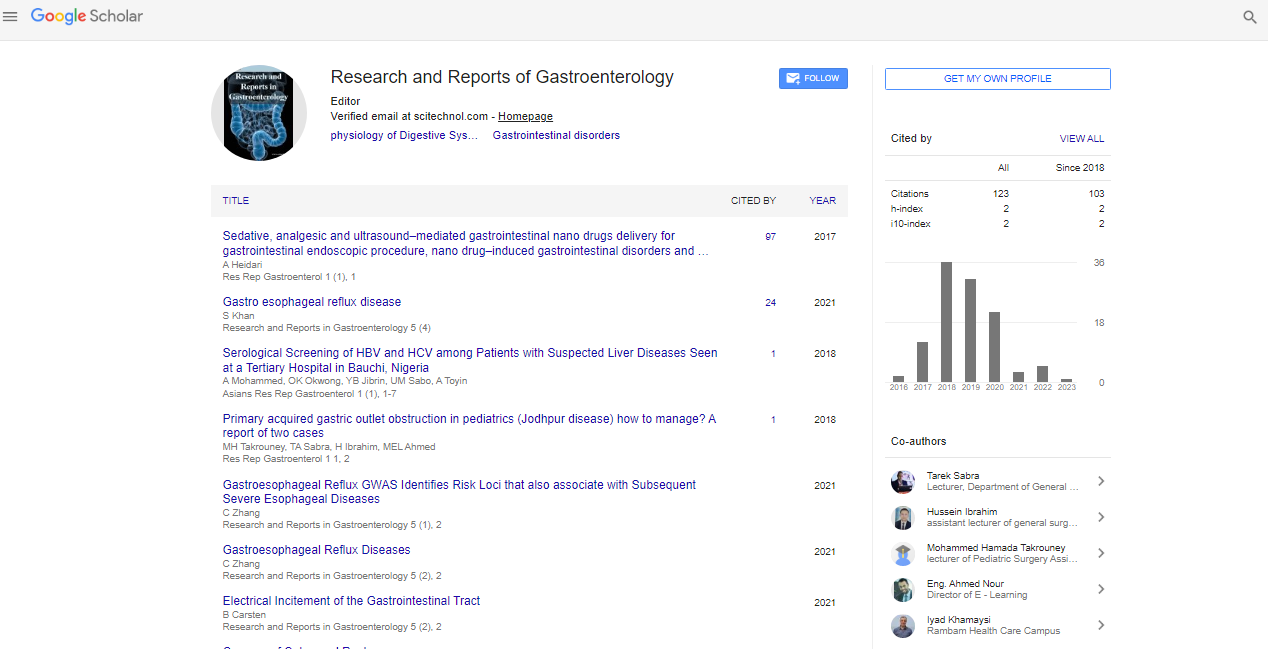Perspective, Res Rep Gastroenterol Vol: 7 Issue: 3
Hepatocellular Carcinoma: Insights into the Liver Menace
Jason Winslow*
1Department of Transplant Surgery, Medstar Georgetown University Hospital, Washington, USA
*Corresponding Author: Jason Winslow,
Department of Transplant Surgery,
Medstar Georgetown University Hospital, Washington, USA
E-mail: winslowjason@gmail.com
Received date: 23 August, 2023, Manuscript No RRG-23-118908;
Editor assigned date: 25 August, 2023, PreQC No RRG-23-118908(PQ);
Reviewed date: 08 September, 2023, QC No RRG-23-118908;
Revised date: 15 September, 2023, Manuscript No RRG-23-118908 (R);
Published date: 22 September, 2023, DOI: 10.4172/Rrg.1000151
Citation: Winslow J (2023) Hepatocellular Carcinoma: Insights into the Liver Menace. Res Rep Gastroenterol 7:3.
Description
Hepatocellular Carcinoma (HCC) is the most common primary liver cancer and a major global health concern. It also discusses recent advances in research and promising therapeutic strategies for this deadly malignancy. Hepatocellular Carcinoma (HCC) is a formidable adversary in the realm of oncology, often diagnosed at advanced stages and known for its dismal prognosis. Understanding the intricacies of HCC is difficult, as it has a significant global impact on public health. This manuscript aims to provide an extensive review of HCC, addressing its epidemiology, etiology, pathogenesis, clinical presentation, diagnostic approaches, and contemporary therapeutic options.
Epidemiology
Hepatocellular carcinoma is a major health concern worldwide. It ranks as the sixth most common cancer and the fourth leading cause of cancer-related mortality globally. HCC incidence varies by region, with the highest prevalence in Asia and sub-Saharan Africa. The disease disproportionately affects men and is often diagnosed in late adulthood, with a median age of around 65 years.
Pathogenesis
Hepatocellular carcinoma usually arises in a background of chronic liver injury and inflammation. The stepwise progression from healthy hepatocytes to cancerous cells often involves genetic mutations, epigenetic alterations, and complex interactions within the tumor microenvironment. Key molecular pathways involved in HCC development include Wnt/β-catenin, p53, and epigenetic modifications.
Clinical presentation
HCC clinical presentation can be variable, but common symptoms and signs include:
• Patients may experience dull or sharp pain in the upper right side of the abdomen.
• Yellowing of the skin and eyes is a sign of impaired liver function.
• HCC can lead to weight loss and muscle wasting.
• Accumulation of fluid in the abdominal cavity is a common complication.
• Henlargement of the liver is often seen in advanced HCC.
• Generalized weakness and fatigue are frequently reported.
• Loss of appetite and early satiety are common.
Diagnosis
The diagnosis of HCC involves a combination of clinical evaluation, imaging studies, and laboratory tests. Common diagnostic tools include:
• Ultrasound, Computed Tomography (CT), and Magnetic Resonance Imaging (Mri) are used to visualize liver lesions and assess tumor size and location.
• Alpha-Fetoprotein (AFP) and Des-gamma-Carboxy Prothrombin (DCP) are commonly used serum markers to aid in HCC diagnosis and monitoring.
• In some cases, a liver biopsy may be performed to confirm the diagnosis and assess the tumor's histological characteristics.
Management
The management of HCC is highly dependent on the stage of the disease, the patient's overall health, and the underlying liver condition. Treatment options include:
• Surgical resection, liver transplantation, and local ablative therapies can be used when the tumor is localized and the patient's liver function is adequate.
• Transarterial Chemoembolization (TACE) and Radiofrequency Ablation (RFA) are often used to treat intermediate-stage HCC.
• Targeted therapies and immune checkpoint inhibitors are available for patients with advanced-stage HCC.
• Symptomatic treatment, palliative care, and management of complications are important for improving the quality of life in advanced cases.
• In carefully selected patients, liver transplantation offers the potential for a cure.
Hepatocellular carcinoma is a formidable cancer with a global impact. Understanding its epidemiology, risk factors, pathogenesis, clinical presentation, and management options is important for healthcare professionals and patients alike. Advances in early detection and innovative treatment strategies offer hope for improving the prognosis of individuals facing this deadly malignancy. Public health efforts to address the underlying risk factors, such as hepatitis B and C, and to promote liver health remain essential in the fight against HCC.
 Spanish
Spanish  Chinese
Chinese  Russian
Russian  German
German  French
French  Japanese
Japanese  Portuguese
Portuguese  Hindi
Hindi 